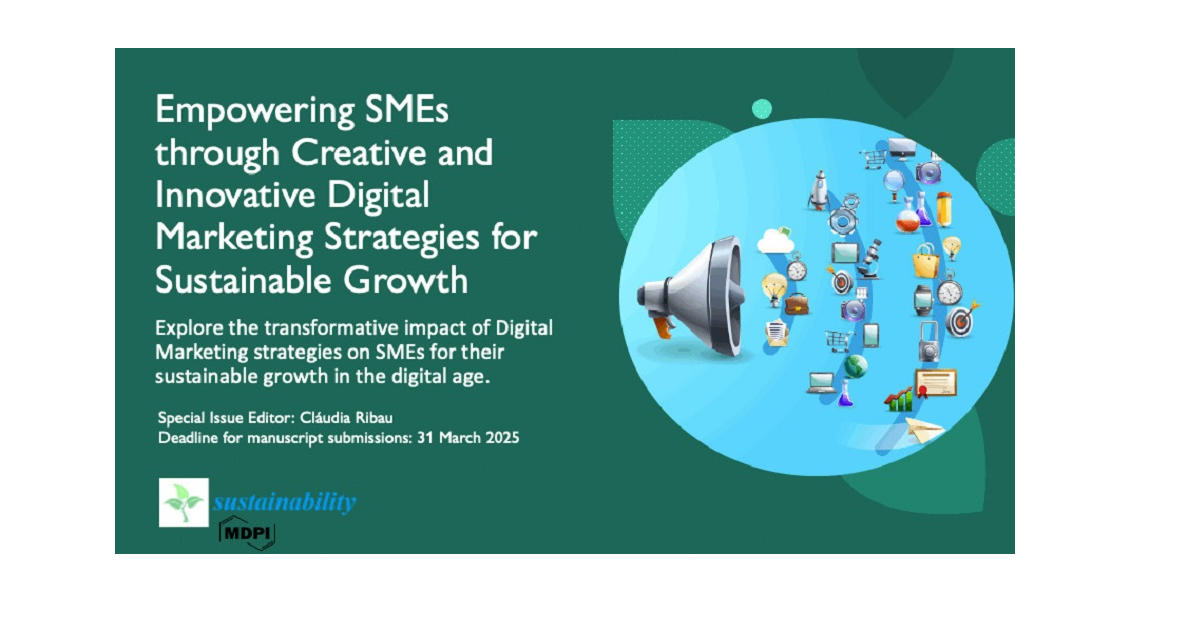Empowering SMEs Through Creative and Innovative Digital Marketing Strategies for Sustainable Growth
A special issue of Sustainability (ISSN 2071-1050). This special issue belongs to the section "Economic and Business Aspects of Sustainability".
Deadline for manuscript submissions: 31 August 2025 | Viewed by 795

Special Issue Editor
Interests: marketing; international marketing; digital marketing particularly on SMEs
Special Issue Information
Dear Colleagues,
In today's fast-paced digital landscape, digital marketing plays a pivotal role in fostering the healthy growth of Small and Medium Enterprises (SMEs) into several core businesses. By leveraging cutting-edge strategies and technologies, SMEs can enhance their online presence, reach a wider audience, and drive sustainable business growth. Digital marketing not only helps SMEs to stand out in competitive markets but also enables them to adapt to evolving consumer behaviors and market trends.
Through harnessing the power of social media platforms to exploit data analytics and customized marketing techniques, SMEs can engage with their target in more meaningful ways. With the adoption of creative and innovative digital marketing strategies, SMEs can enhance their competitiveness, foster customer loyalty, and drive long-term success in an ever-evolving marketplace.
This Special Issue of Sustainability explores the transformative impact of digital marketing strategies on SMEs, highlighting their role in driving innovation, fostering customer engagement, and ultimately propelling business success and empowering SMEs for sustainable growth in the digital age.
We invite researchers and practitioners to submit original research papers, case studies, and theoretical perspectives that contribute to the following themes (as keywords).
Dr. Cláudia Ribau
Guest Editor
Manuscript Submission Information
Manuscripts should be submitted online at www.mdpi.com by registering and logging in to this website. Once you are registered, click here to go to the submission form. Manuscripts can be submitted until the deadline. All submissions that pass pre-check are peer-reviewed. Accepted papers will be published continuously in the journal (as soon as accepted) and will be listed together on the special issue website. Research articles, review articles as well as short communications are invited. For planned papers, a title and short abstract (about 100 words) can be sent to the Editorial Office for announcement on this website.
Submitted manuscripts should not have been published previously, nor be under consideration for publication elsewhere (except conference proceedings papers). All manuscripts are thoroughly refereed through a single-blind peer-review process. A guide for authors and other relevant information for submission of manuscripts is available on the Instructions for Authors page. Sustainability is an international peer-reviewed open access semimonthly journal published by MDPI.
Please visit the Instructions for Authors page before submitting a manuscript. The Article Processing Charge (APC) for publication in this open access journal is 2400 CHF (Swiss Francs). Submitted papers should be well formatted and use good English. Authors may use MDPI's English editing service prior to publication or during author revisions.
Keywords
- digital marketing strategies for SMEs (in different business areas)
- digital marketing innovation
- digital marketing creativity
- online presence
- digital business growth on SMEs
- consumer behavior on digital platforms
- market trends on digital platforms
- customer engagement on digital platforms
- competitive advantage on digital media
- artificial intelligence
Benefits of Publishing in a Special Issue
- Ease of navigation: Grouping papers by topic helps scholars navigate broad scope journals more efficiently.
- Greater discoverability: Special Issues support the reach and impact of scientific research. Articles in Special Issues are more discoverable and cited more frequently.
- Expansion of research network: Special Issues facilitate connections among authors, fostering scientific collaborations.
- External promotion: Articles in Special Issues are often promoted through the journal's social media, increasing their visibility.
- e-Book format: Special Issues with more than 10 articles can be published as dedicated e-books, ensuring wide and rapid dissemination.
Further information on MDPI's Special Issue policies can be found here.





